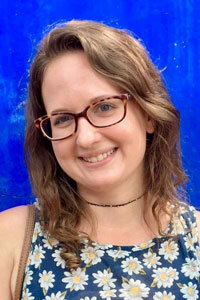Five Questions with First-Years: With Leah Butterfield
In our latest edition of "Five Questions with First-Years," we sat down with Leah Butterfield, who comes to UT-Austin American Studies from Atlanta, by way of New York City, by way of the great city of Pittsburgh, Pennsylvania. Leah, who plans to study and write about the experience of solitary women in processes of travel and migration, recounts her experience working for online journalistic publications coming out of college, and also details a set of intellectual inspirations that is dizzying in its diversity and scope. Read on!
nqemoaeTqw
1) What is your background, academic or otherwise, and how does it motivate your teaching and research?
I grew up in Atlanta, then went to NYU for my B.S. in Media, Culture, and Communication (with a minor in English and American Literature). After graduating, I stayed in New York and worked as a freelance writer for Bustle, The Village Voice and Time Out New York, and as an Associate Editor at a men’s lifestyle publication. Over the course of a few years—during which I produced far too many clickbait articles on menswear shops, tailgating gear and sexy Instagram accounts—I decided that maybe journalism wasn’t the best way for me to feel fulfilled or to make an impact. So I headed to Carnegie Mellon where I received my M.A. in Literary and Cultural Studies last year.
2) Why did you decide to come to AMS at UT for your graduate work? I was really excited by the flexibility and interdisciplinary nature of the AMS program. My research interests are pretty wide-ranging, so I loved that I’d be able to take courses with AMS faculty as well as across other departments, and ultimately to be able work on a dissertation that might feel out of place in a more traditional discipline like English or History.
3) What projects or people have inspired your work?Tough question! I’ve been inspired by so many awesome scholars and projects over the years. As I’m reflecting on it, I actually find that the texts that challenge me the most are the ones that have ended up sending me in the most fruitful directions for research. Much of my work has been inspired by really smart people tackling broad societal issues, including (from a hodgepodge of fields, and in no particular order): Judith Butler, Gayle Rubin, Michael Warner, Edward Said, Raymond Williams, Theodor Adorno. While I don’t plan to emulate any of these theorists, I find their ideas incredibly useful for guiding my approach to work on gender and culture.At the same time, in terms of writing style and critical intent, I take a lot of inspiration from long-form journalism and literary nonfiction—books like Adrian Nicole LeBlanc’s Random Family and Sonia Nazario’s Enrique’s Journey, and writers like David Foster Wallace, Joan Didion, George Orwell and Mark Twain.
4) What projects do you see yourself working on at UT?My research interests revolve around travel and migration, and I plan to use my time at UT to explore the role of solitary women in those processes. I’m particularly interested in the literary and cultural history of the figure of the lone woman, as well as in the overlaps and connections between travel (typically associated with leisure) and migration (typically associated with hardship).
5) What are your goals for graduate school? What do you see yourself doing after you graduate?My goal is to learn as much as I can from the interesting and talented faculty and students around me, and to use that knowledge to further my own research and teaching. At this point, I’m keeping an open mind about post-grad life: academia, journalism, museum work, international nanny… We’ll see what happens!
Bonus Question: In your own words--what is American Studies?I’ve been dreading this question the whole time! When I try to explain American Studies to people unfamiliar with it, I usually describe it as drawing on fields like English, Cultural Studies, History, Media Studies (plus Anthropology, Sociology, Geography…), with American Studies prioritizing research that addresses both high and low culture, spans mediums, time periods and locations, and that tries to link small-scale studies to larger social issues.
